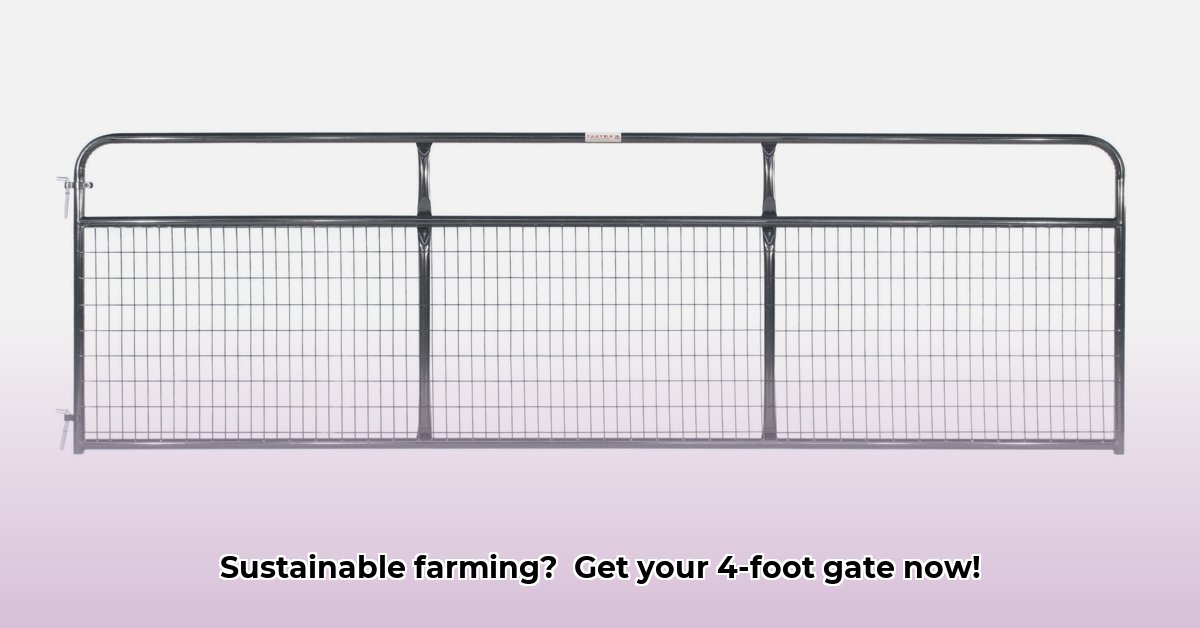
Choosing the right farm gate isn't just about convenience; it's a crucial decision impacting your farm's sustainability. This guide focuses on Tractor Supply's 4-foot gates and their role in creating a greener, more environmentally responsible farming operation. We'll cover material selection, installation, maintenance, and the broader implications of sustainable fencing practices. For more gate options, check out Tractor Supply gates.
Selecting Sustainable Materials for Your 4-Foot Gate
Sustainability in farming extends beyond crop choices; it encompasses every aspect, including fencing. A 4-foot gate from Tractor Supply, when chosen thoughtfully, can significantly contribute to a greener farm. But how do you choose sustainably?
Material Matters: The material significantly impacts environmental sustainability. Recycled or reclaimed materials are ideal. If using wood, opt for sustainably harvested lumber certified by the Forest Stewardship Council (FSC) to ensure responsible forest management. Metal gates, particularly those made from recycled steel, offer another viable sustainable option.
Construction: Durability is key to sustainability. A well-constructed gate, with sturdy hinges and reliable latches, requires fewer replacements, reducing waste and resource consumption.
Treatment: For wooden gates, consider the type of treatment. Choose options with minimal or no harmful chemicals, minimizing environmental impact. Did you know that untreated lumber, while seemingly natural, may decompose faster, requiring more frequent replacements?
Key Point: Prioritizing durable, sustainably sourced materials minimizes your environmental footprint and reduces long-term costs.
Installing Your 4-Foot Gate: A Step-by-Step Guide
Proper installation is critical for a long-lasting, functional gate. Follow these steps for optimal results:
Preparation: Clear the area around the gate's location and ensure the ground is level. This ensures the gate operates smoothly and extends its lifespan. (A level foundation prevents strain on hinges and posts.)
Post Placement: Set posts firmly using concrete for maximum stability. Post depth is critical; aim for at least 3 feet for optimal support. (Proper post depth prevents sagging and ensures the gate's longevity.)
Gate Hanging: Carefully hang the gate on its hinges, ensuring it moves freely. A properly hung gate prevents undue stress and wear.
Latch Installation: Securely attach the latch, ensuring reliable closure to keep livestock safely contained. (A secure latch is essential for animal safety and farm security.)
Final Inspection: Double-check alignment and operation for smooth, easy use.
Maintaining Your Gate for Longevity
Regular maintenance extends your gate's lifespan and maximizes its sustainability. Implement this simple checklist:
Hinges and Latches: Periodically inspect for wear and tear, lubricating as needed or replacing when necessary.
Damage Repair: Address any minor damage promptly to prevent escalation. Swift action prevents small issues from becoming major problems.
Cleaning: Regular cleaning removes debris and material that might affect the gate's operation.
Key Point: Proactive maintenance significantly extends your gate's operational life, reducing the need for replacements.
Beyond the Gate: Broader Sustainable Fencing Practices
Sustainable farming requires a holistic approach. Consider these additional strategies:
Livestock Management: Strategic grazing patterns (e.g., rotational grazing) can improve soil health and reduce overgrazing in particular areas, contributing to improved land management.
Biodiversity: Strategically designed fencing can create habitats that support beneficial insects and pollinators.
A sustainable 4-foot gate from Tractor Supply is just one element of a broader sustainability strategy. By combining smart material choices, proper installation, and regular maintenance, you contribute to a greener future for your farm and the planet. Remember that sustainable practices are interconnected – your gate choice is a step towards a more sustainable farming operation.
Dr. Emily Carter, Agricultural Sustainability Expert at Cornell University: "Sustainable farming necessitates a holistic view. Every choice, from the seed to the fence, impacts overall efficiency and environmental impact."